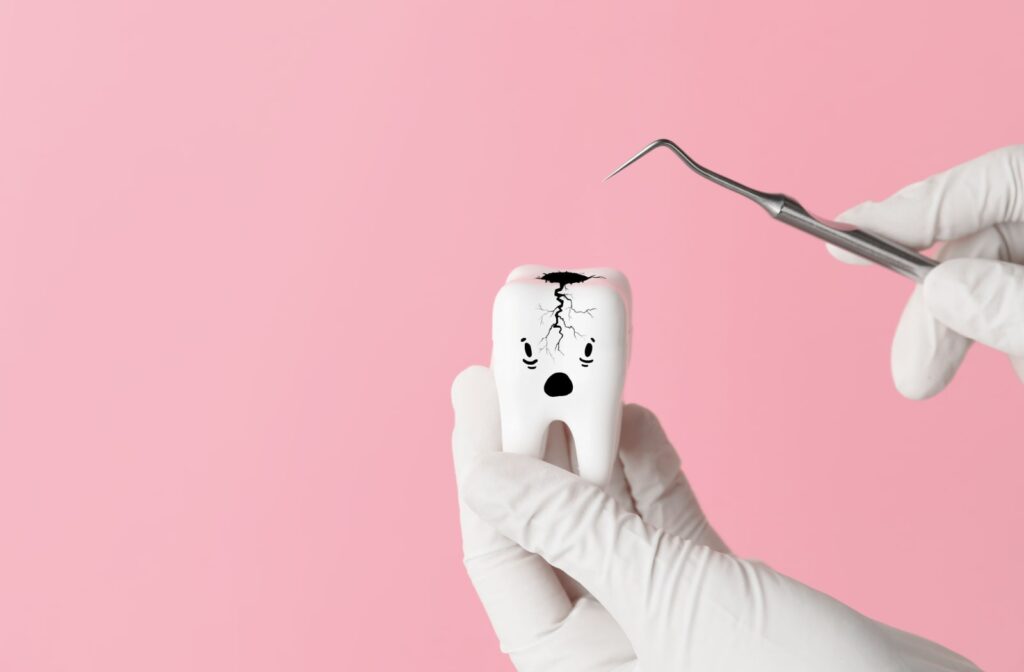Does a Cracked Tooth Need to Be Pulled?
Experiencing a cracked tooth can often be a source of anxiety and prompt one crucial question: does the tooth need to be extracted? The answer is not always straightforward.
If your tooth has a minor crack, restorative dentistry may be able to preserve the tooth. However, extraction may be the only treatment if the damage is too severe and the tooth becomes unhealthy. Luckily, extractions are a last resort, so visit your dentist about your cracked tooth before it advances to the point of no return.
Signs & Symptoms of a Cracked Tooth
Pain or discomfort is often the first indication that something is not right with your tooth. A cracked tooth might cause:
- Pain while chewing: A sharp and erratic pain that occurs during chewing might suggest a crack.
- Sensitivity to temperatures: A noticeable discomfort when consuming hot or cold foods or drinks could be symptomatic of a crack.
- Swelling and inflammation: These could indicate the tooth has experienced some level of trauma or infection.
Types of Cracked Teeth
Understanding the various kinds of tooth fractures can help pinpoint the necessary treatment.
- Craze lines: These are superficial cracks in the enamel that are usually of little concern.
- Fractured cusp: A piece of the chewing surface breaks off, often around a filling. This can usually be repaired without too much fuss.
- Cracked tooth: This type involves a crack extending from the chewing surface down towards the root. Timely intervention is crucial.
- Split tooth: This is when a tooth is split into 2 distinct parts. Rescue is more challenging in these cases.
- Vertical root fracture: A crack that starts at the root and extends upward. These often show subtle symptoms but can be quite severe.

Factors Influencing Treatment Options
Before deciding on the course of action, your dentist typically considers 3 main factors:
- Severity: The extent of the crack significantly impacts the treatment approach.
- Location: A crack in an easily accessible area is less complex to treat than one below the gum line.
- Overall dental health: The condition of surrounding teeth and gums also plays a part in the decision-making process.
Treatment Options for Cracked Teeth
There’s a spectrum of treatments available for cracked teeth, including:
- Dental bonding or filling: For minor cracks, a simple bonding or filling might be enough to repair the tooth structure.
- Dental crown: A crown acts as a cap covering the cracked tooth, protecting the crack from bacteria and restoring structural integrity to prevent further damage.
- Root canal treatment: If the crack has reached the pulp, the soft inner layer of the tooth, a root canal might save the tooth.
- Tooth extraction: As a last resort, extraction might be the answer when the tooth cannot be salvaged.
When Tooth Extraction Is Necessary
Certain situations necessitate the removal of a cracked tooth, including:
- Irreparable damage: If the crack extends below the gum line, it may be impossible to save the tooth.
- Risk of infection: A crack can lead to infection of the pulp tissue if exposed to bacteria. An infection can spread to the bone and gum surrounding the problematic tooth if severe.
- Impact on neighbouring teeth: To prevent potential damage to adjacent teeth, pulling may be the best option.
Prevention & Maintenance
Prevention is always preferable to treatment. To keep your teeth healthy and strong, incorporate supportive routines.
- Regular dental check-ups: Routine visits to your dentist can help detect problems early on and prevent the need for invasive dental work.
- Oral hygiene practices: Regular brushing and flossing maintain your teeth’s integrity and strength. It prevents tooth decay and gum disease.
- Avoiding habits that can damage teeth: Biting down on hard foods or objects, ice-crunching habits, and not wearing protective mouthguards during sports can lead to fractures.
Visit the Dentist for Your Cracked Tooth
Assessing a cracked tooth is not a DIY affair. Seek professional dental advice at Dentistry on Danforth when you detect symptoms to determine the right course of action. While it is true that some cracks can result in extractions, many can be treated with less drastic measures, allowing you to preserve your natural tooth.Dental health is crucial to your overall well-being, so do not take those small signs for granted. Schedule a dental exam and cleaning to prevent exhaustive dental work and maintain your healthy smile.


